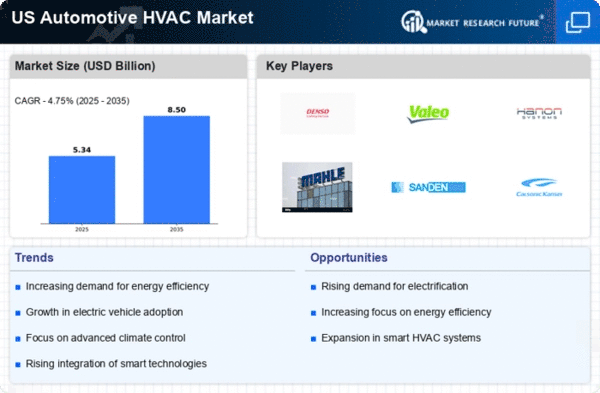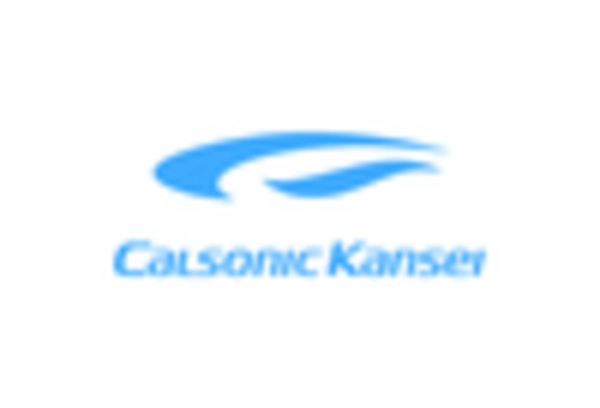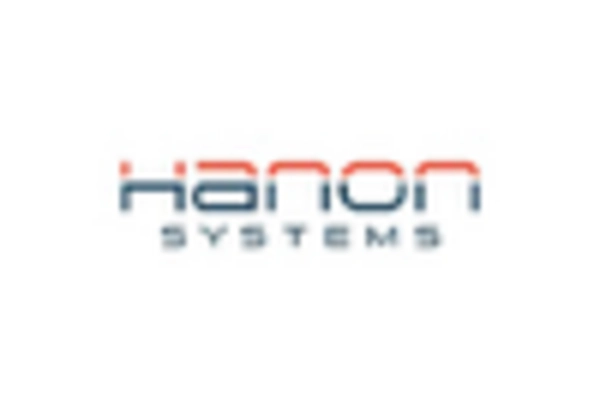Regulatory Push for Emission Reductions
The automotive hvac market is significantly influenced by stringent regulatory frameworks aimed at reducing vehicle emissions. In the US, regulations set forth by the Environmental Protection Agency (EPA) mandate lower greenhouse gas emissions from vehicles, which directly impacts the design and functionality of hvac systems. Manufacturers are increasingly required to adopt more efficient technologies that minimize energy consumption and emissions. This regulatory push has led to innovations in the automotive hvac market, such as the development of systems that utilize alternative refrigerants with lower global warming potential. The market is projected to grow as companies invest in research and development to comply with these regulations, potentially increasing the market size by 10% over the next few years. Consequently, the automotive hvac market is adapting to these regulatory challenges while striving to meet consumer expectations for performance and sustainability.
Shift Towards Electrification of Vehicles
The automotive hvac market is undergoing a transformation due to the shift towards electrification in the automotive industry. As electric vehicles (EVs) gain traction, the demand for efficient hvac systems that cater to the unique needs of these vehicles is increasing. Traditional hvac systems may not be suitable for EVs, prompting manufacturers to develop specialized systems that optimize energy use while maintaining passenger comfort. This shift is expected to drive innovation within the automotive hvac market, as companies explore new technologies that enhance efficiency and performance in electric models. The market for hvac systems in EVs is projected to grow by approximately 12% annually, reflecting the increasing adoption of electric vehicles. Consequently, the automotive hvac market is likely to evolve in response to this electrification trend, presenting new opportunities for manufacturers and suppliers alike.
Technological Advancements in HVAC Systems
Technological advancements play a pivotal role in shaping the automotive hvac market. Innovations such as variable refrigerant flow (VRF) systems and advanced heat pump technologies are revolutionizing how vehicles manage climate control. These systems not only enhance energy efficiency but also improve overall performance, making them increasingly attractive to manufacturers. The integration of smart technologies, such as IoT connectivity, allows for real-time monitoring and adjustments, further optimizing hvac performance. As a result, the automotive hvac market is expected to grow at a compound annual growth rate (CAGR) of around 8% over the next five years. This growth is driven by the need for more efficient and responsive climate control solutions that align with consumer expectations for modern vehicles. Thus, technological advancements are likely to remain a key driver in the evolution of the automotive hvac market.
Rising Consumer Demand for Comfort Features
The automotive hvac market experiences a notable surge in consumer demand for enhanced comfort features within vehicles. As consumers increasingly prioritize comfort during their driving experience, automakers are compelled to integrate advanced hvac systems that provide superior climate control. This trend is reflected in the growing sales of vehicles equipped with multi-zone climate control systems, which have seen an increase of approximately 15% in recent years. Furthermore, the automotive hvac market is adapting to consumer preferences for personalized settings, leading to innovations in user interfaces and controls. The emphasis on comfort not only enhances the driving experience but also drives competition among manufacturers to offer more sophisticated hvac solutions, thereby propelling market growth. As a result, The automotive HVAC market is expected to continue expanding due to rising consumer expectations for comfort and convenience..
Increased Focus on Sustainability and Eco-Friendly Solutions
The automotive hvac market is witnessing a heightened focus on sustainability and eco-friendly solutions as consumers and manufacturers alike become more environmentally conscious. This trend is prompting the development of hvac systems that utilize sustainable materials and energy-efficient technologies. Manufacturers are increasingly investing in research to create systems that not only reduce energy consumption but also minimize the environmental impact of refrigerants used in hvac systems. The automotive hvac market is projected to see a growth rate of around 9% as companies strive to meet consumer demand for greener alternatives. This emphasis on sustainability is likely to drive innovation and competition within the market, as manufacturers seek to differentiate their products through eco-friendly features. As a result, the automotive hvac market is expected to evolve, aligning with broader trends towards sustainability in the automotive sector.
















